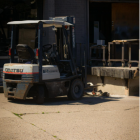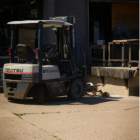Forklifts are indispensable in various industries, offering an efficient solution for moving heavy loads safely and quickly. Their role is critical in ensuring the seamless flow of goods and materials within warehouses, construction sites, and factories. However, like any piece of machinery, proper forklift maintenance is essential to uphold peak performance and safety standards. Unfortunately, many businesses overlook key maintenance practices, leading to unnecessary repairs and operational downtimes. In this article, we’ll delve into these common forklift maintenance pitfalls and provide actionable advice on how to circumvent them.
Importance of Regular Maintenance
Routine maintenance is the cornerstone of forklift safety and efficiency. Overlooking maintenance can result in unexpected breakdowns that not only halt operations but also pose significant safety hazards to operators and other workers. Consistent maintenance practices not only enhance the lifespan of your forklifts but also ensure that you derive maximum value from your investment by minimising the frequency of costly repairs.
Beyond just preventing breakdowns, regular maintenance keeps your forklifts operating at peak efficiency, which translates to better fuel economy and fewer emissions for internal combustion models. For electric forklifts, it means longer battery life and more reliable performance. Furthermore, adhering to a strict maintenance schedule helps in complying with safety regulations and standards, thereby avoiding potential fines or legal issues.
Common Forklift Maintenance Mistakes
Skipping Regular Inspections
Skipping regular inspections is a prevalent mistake among businesses that can have dire consequences. Inspections are crucial for detecting wear and tear, leaks, and other issues that, if left unchecked, could escalate into serious problems. Unfortunately, some businesses skip these inspections due to time constraints, limited resources, or a lack of understanding of their importance.
To avoid this mistake, businesses should establish a routine inspection schedule that is strictly adhered to. Training staff to conduct these inspections is equally important, ensuring they know what to look for and how to report findings effectively. Additionally, integrating inspections into daily routines can help catch issues early, saving time and money in the long run.
Using the Wrong Parts
Another common error is using incorrect or substandard parts during repairs or replacements. This practice can severely compromise the forklift’s performance and safety, increasing the risk of accidents or further damage. Using the wrong parts can also void warranties, adding unnecessary expenses to the business.
Avoid this by always sourcing parts from reputable suppliers who specialise in forklift components. It’s crucial to verify that the parts are compatible with your specific forklift model. Building a relationship with a trusted supplier can also be beneficial, providing assurance that you have access to quality parts whenever needed.
Ignoring Manufacturer Guidelines
Manufacturers provide specific guidelines for maintaining their equipment, which are often overlooked. These guidelines are designed to ensure that forklifts are serviced properly and operate safely. Ignoring them can lead to improper handling and increased wear and tear, shortening the equipment’s lifespan.
To prevent this, always follow the manufacturer’s maintenance schedule and guidelines diligently. Keep a copy of the manual accessible to all staff involved in maintenance tasks and encourage them to familiarise themselves with its contents. Regular refresher sessions on these guidelines can also ensure everyone remains informed about the best maintenance practices.
Inadequate Record Keeping
Maintaining detailed records of all maintenance activities is essential but often neglected. Without proper documentation, it becomes challenging to track what maintenance has been completed and when future tasks are due. This can lead to missed maintenance intervals and potential mechanical failures.
Implement a robust system for recording all maintenance activities, which can be as simple as a logbook or a more advanced digital system. Regularly reviewing these records helps ensure that maintenance is conducted timely and that no critical tasks are overlooked. Proper record-keeping also provides valuable insights into the operational history of your forklifts, aiding in better decision-making.
Overlooking the Importance of Training
Maintenance requires specialised skills and knowledge, yet inadequate training for maintenance staff remains a common oversight. Without proper training, staff may perform improper repairs or servicing, which can have severe safety and operational consequences.
Investing in regular and comprehensive training for your maintenance team is crucial. Keeping them updated with the latest maintenance techniques and technologies ensures that they can handle any issues competently. Consider partnering with training organisations or manufacturers to provide certified courses that enhance the skills and confidence of your team.
Not Addressing Minor Issues
Minor issues often go unnoticed or are intentionally ignored, leading to significant problems over time. Small faults can quickly escalate, resulting in costly repairs and extended downtimes that disrupt business operations.
Encouraging a proactive maintenance culture can mitigate this risk. Create an environment where reporting even minor issues is encouraged and ensure they are addressed promptly. By tackling small problems early, you prevent them from developing into major, costly repairs.
Neglecting Battery Care
For electric forklifts, battery maintenance is a critical aspect that should not be overlooked. Poor battery care can lead to reduced performance, shorter battery life, and increased operational costs. Neglecting battery maintenance can also lead to safety hazards, such as battery leaks or overheating.
To avoid these issues, follow best practices for battery maintenance, which include regular charging, cleaning, and checking electrolyte levels. Training staff on proper battery care and handling procedures is vital to ensure the longevity and reliability of your forklifts. Regular battery inspections and maintenance can prevent unexpected failures and keep your forklifts running smoothly.
Conclusion
Maintenance is an essential component of ensuring the safety and efficiency of your operations. By identifying and avoiding these common mistakes, you can implement a robust maintenance routine that extends the life of your forklifts, reduces downtime, and ensures a safe working environment. Remember, regular maintenance is not just a cost but an investment in the longevity and reliability of your equipment.
Incorporate these strategies into your maintenance plan to keep your forklifts operating smoothly and efficiently. Proper maintenance not only saves money in the long run but also ensures that your business operations continue without interruption. By understanding and addressing these common maintenance mistakes, you can ensure that your forklifts remain in optimal condition, providing safe and reliable service for years to come.




